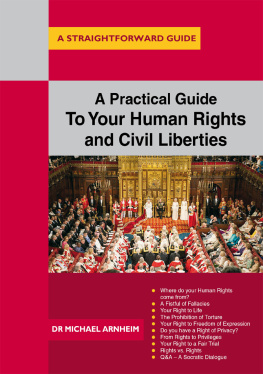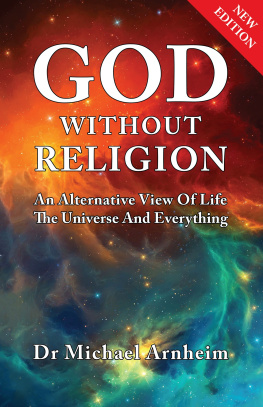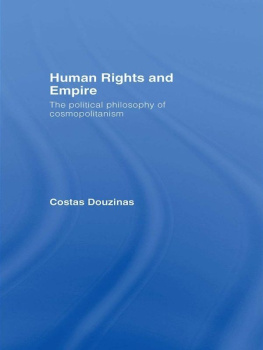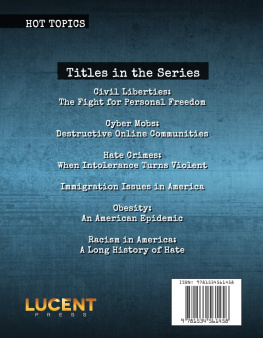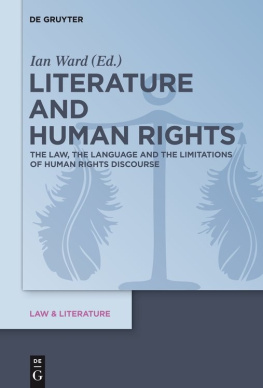A Practical Guide
To Your Human Rights
and Civil Liberties
Dr Michael Arnheim
Barrister at Law
Sometime Fellow of St Johns College, Cambridge
Straightforward Publishing
www.straightforwardco.co.uk
Copyright Dr Michael Arnheim 2017
Dr Michael Arnheim has asserted the moral right to be identified as the author of this work.
All rights reserved. No part of this publication may be reproduced in a retrieval system or transmitted by any means, electronic or mechanical, photocopying or otherwise, without the prior permission of the copyright holders.
ISBN 978-1-84716-673-9
eISBN: 978-1-84716-730-9
Kindle ISBN: 978-1-84716-729-3
Printed by 4edge www.4edge.co.uk
Cover Photograph: Copyright House of Lords 2016 / Photography by Roger Harris
Whilst every effort has been made to ensure that the information contained within this book is correct at the time of going to press, the author and publisher can take no responsibility for any errors or omissions contained within.
Contents
PREFACE
This book is appearing at a critical time for Britain and for your human rights as a law-abiding member of society. The winning slogan of the Leave campaign to take Britain out of the EU was Take Back Control supposedly including taking back control of human rights law from the European Court of Human Rights in Strasbourg, which was blamed for expanding the scope of the European Convention on Human Rights (ECHR) in a politically correct direction. However, it turns out that Brexit is not going to free the UK from the toils of Strasbourg or the ECHR after all. Not that that makes any difference, because the UK domestic courts are not obliged to follow Strasbourg decisions slavishly in any event but only to take them into account. The fact that UK domestic judges with some notable exceptions tend to follow the Strasbourg line is their own choice. This is not going to change after Brexitunless the Government takes corrective action by passing legislation through Parliament to curb judicial activism, which is not at all likely.
Your human rights will therefore continue to be eroded -- unless you happen to belong to one of the categories favoured by political correctness (PC). On the other hand, if you belong to the non-PC forgotten people who gave out a great roar by voting Leave in the UKs Brexit referendum on 23 June 2016 or for Donald Trump as US President, or if you are a supporter of the growing populist movement sweeping mainland Europe, then you may one day not without great difficulty manage to roll back the PC tide that has already engulfed the chattering classes of the West, and in so doing you may be able to reclaim the genuine human rights to which you are entitled.
I owe a debt of gratitude to more people than I can mention, and not least to my friends Jack Ward, Rosie Craig, Shola Awaoderu and Brian Abramson, and also to my publisher, Roger Sproston, who has performed yeoman service in preparing the book for publication.
This is my nineteenth published book to date. Two previous titles were also on human rights:
The Handbook of Human Rights Law, Kogan Page, London, 2004; and
The Problem with Human Rights Law, Civitas, London, 2015.
Some of my Huffington Post blogs also deal with human rights:
www.huffingtonpost.co.uk/author/dr-michael-arnheim
You will find my Wikipedia biography here:
https://en.wikipedia.org/wiki/Michael_Arnheim
Dr Michael Arnheim
London
15 February 2017
Chapter 1
Where Do Your Human Rights Come From?
Where do your human rights come from? Which begs the question: Where do rights in general come from? Which begs the yet further question: What exactly is a right?
Philosophers and other theorists have long had a field day debating the meaning of rights, but this exercise tends to produce more heat than light. In this book I am more concerned to view rights from a practical point of view. But it will do no harm to start at least by quoting a current accepted academic definition of rights from the Stanford Encyclopedia of Philosophy: Rights structure the forms of our governments, the contents of our laws, and the shape of morality as we perceive it. So far, so good.
But this somewhat pompous pronouncement offers no explanation of where rights come from, though it does at least provide us with a threefold classification of rights rights connected with government, legal rights and moral rights. Here are a few examples:
The right to vote in elections a political right associated with government.
The Right to remain silent a legal right that is particularly relevant to criminal law.
The right to expect courteous treatment by others a moral right.
We are now ready to explore the provenance of rights, in order to test their validity.
Natural Rights
There has been a long tradition of belief in natural or God-given rights (which are not necessarily synonymous), or imprescriptible or inalienable rights, meaning absolute rights that do not depend on any grant and are irremovable. Such concepts can be traced back to Ancient Greece, and there has been no shortage of theories in support of them in modern times. But it is important to stress that these theories without more have no practical effect and do not entitle anyone to claim any rights regardless of the what the academic proponents of such theories may say. Nevertheless, I will spend a little time just putting these ideas into context.
The concept of natural rights is closely associated with belief in natural law, which was famously defined by the Roman statesman and philosopher Cicero: True law is right reason in agreement with nature, universal, unchangeable and eternal, which calls us to duty by its commands and restrains us from wrongdoing by its prohibitions. But how can we tell whether a particular dictate is indeed in accordance with nature? There is no answer to this conundrum. Slavery, for example, was taken for granted by Cicero as natural, though he believed that slaves should be treated humanely, and he is known to have freed some of his own slaves, notably Tiro, who served as his secretary both as a slave and later after he was emancipated. After Ciceros death Tiro was able to buy an estate near Puteoli, probably from a bequest left to him by his former master, and it was Tiro who was instrumental in publishing his former masters collected works before he himself died at the age of 99. But the fact remains that Cicero regarded slavery as part of the natural order - which no modern believer in natural law would accept. But slavery is only one issue on which upholders of natural law disagree with one another. Other such issues include abortion, the rights of the unborn child, contraception, homosexuality and the whole question of equality. This goes to show just how vague and imprecise the content of natural law is, which makes it impossible to base anything on it.
St Thomas Aquinas, the famous medieval Catholic philosopher and theologian who combined Christianity with ancient Greek philosophical thought, notably that of the great Greek philosopher Aristotle, largely identified natural law with divine law, seeing divine law as essentially natural law with the infusion of scriptural revelation. Natural law, he declared, prescribes virtuous actions, since everyones reason naturally dictates to him to act virtuously. Aquinas identified the four cardinal natural virtues as prudence, temperance, justice and fortitude, to which he added the three theological virtues of faith, hope and charity.
There is no shortage of modern natural law/natural rights protagonists, one of the best known of whom is Professor John Finnis of Oxford with his theory of practical reasonableness in his book titled

